#american cancer-root
Explore tagged Tumblr posts
Photo


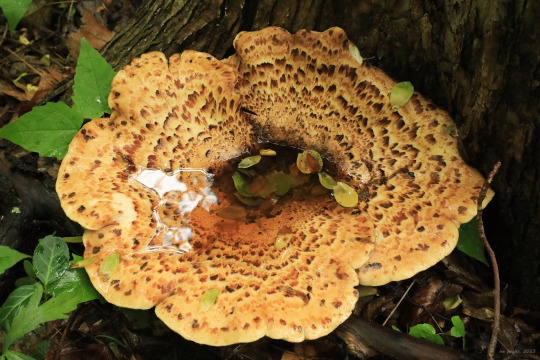







Part 1: After the Rain - Life in an Appalachian Temperate Forest.
From top: Dryad’s saddle (Cerioporus squamosus), a magnificent and edible shelf fungus of Appalachia’s spring forests; wild comfrey (Cynoglossum virginianum), a native borage sometimes also referred to as blue hounds tongue; violet wood sorrel (Oxalis violacea); American cancer-root (Conopholis americana), a parasitic plant that attaches to oak tree roots; northern maidenhair fern (Adiantum pedatum); and wild stonecrop (Sedum ternatum), also known as three-leaved stonecrop.
#appalachia#vandalia#west virginia#toms run preserve#west virginia land trust#temperate forest#rain#intense green#flora#wildflowers#fungi#may#dryad's saddle#pheasant's back#wild comfrey#blue hounds tongue#violet wood sorrel#american cancer-root#northern maidenhair fern#wild stonecrop#three-leaved stonecrop
134 notes
·
View notes
Text


5/26/24
#plant#flowering plant#Conopholis americana#american cancer-root#eucidots#asterids#parasitic plant#Lamiales#Orobanchaceae
0 notes
Text
man i just don't enjoy a villain protagonist. remember when that was a massive thing here years ago?? like people ate that shit up
#im not insane for this right? it was a big thing#i love a good villain but as a pov character.... nahhhhhhh#so i finally watched breaking bad and it's a great show but just so not my thing#i feel like s4 would've been a perfect end because genuinely? i don't want to know any more#getting through s5 was like pulling teeth#this show is so deeply american (neutral statement!! i get it! it's compelling) but to me... we didn't need to see walt get his due#it feels very idk. moralistic fairytale. to me. the rise and fall of it all#i think the story would've been more compelling if it was left open-ended#and more tragic too!#like i do NOT root for walt. he's fucking awful. i want him to get caught. and yet somehow watching s5 is so so so so deeply frustrating#the real tragedy here is that a chemistry teacher can't pay off his cancer treatments#chat tag#also please don't come on this post and tell me i missed the point of the show i'm not interested in that sort of discussion#anyway. good show or whatever
7 notes
·
View notes
Text
The plant in question is Conopholis americana! (Synonym Orobanche americana)

I’d been observing these guys growing on oak roots for ages and had basically given up on learning what they were. Based on their general growth mode and oddness I figured they were probably some kind of fungus, but they’re actually plants! A parasitic non-photosythesizing plant, so I feel like I was justified in not immediately thinking they were plants.

The only part of the plant that’s really visible is the flower spike, which sprouts in the spring and stays through the year after turning dark brown and going to seed. The parasitized oak roots aren’t visible in my pictures, but they develop rounded knobs in response to C. americana.
Too tired to post properly abt it, but I finally IDed a species that I’ve been trying to identify/figure out for about a decade and I’m very pleased.
#one of the common names is the american cancer root#which is unnecessarily mean#my blather#there’s a related species in my wildflower field guide but theses guys aren’t mentioned at all#only ided them with some keyword searches on google
11 notes
·
View notes
Text
Degrees Series: The Hidden Power of Cancer Degrees: (4°, 16°, 28°)

In astrology, we often associate Cancer with emotions, home, family, and nurturing energy. It carries the archetype of the healer and the divine mother. But the degrees within Cancer hold even deeper, meanings, especially when specific planetary placements activate them.

﹙♡﹚ The Influence of 4° Cancer: People, Home, and National Identity =
At 4° Cancer, the theme of people—whether as individuals or in a collective—becomes paramount. This degree speaks to the human race, crowds, and gatherings of individuals. It connects to feelings of patriotism and loyalty to one’s nation or homeland.
Jackie Kennedy has Mars at 4° Cancer. Known for her grace, poise, and connection to the American people. Kennedy was driven by her connection to people, especially during her time as First Lady. The 4° Cancer degree ties deeply to national identity, patriotism, and the well-being of the collective.

If you have placements here, you may find a deep connection to your hometown, feeling rooted in your origins. This degree reflects the home, but not just the physical structure—it taps into where you feel safe and grounded. It’s a degree that nurtures national pride and family ties, creating a strong bond with the place you come from.
4° Cancer is also connected to water in all its forms—lakes, swimming pools, even the tears we cry. It can indicate the emotional waters we swim through, as well as the literal fluids we consume like milk or beer.
16° Cancer: Patriotism, War, and National Tragedies 🇺🇸⚔️
The 16th degree of Cancer brings a sharp focus on national identity and the deep patriotism we hold for our country or homeland. This degree connects the nation with its people, often indicating leaders or public figures who carry the weight of their country’s identity.
However, it can also reveal the darker side of nationalism—leaders driven by a warped sense of patriotism, often leading to war and tragedy. We see this influence clearly in the charts of dictators and rulers whose actions brought great suffering to their people.
Adolf Hitler had Venus at 16° Taurus—a Cancer degree—conjunct Mars (war) in the 7th house (war and conquest). His nationalism drove him to conquer lands (Taurus/territory) and wage war in the name of his people (Cancer degree). The degree here shows not only his nationalist agenda but also how it manifested in destructive ways, leading to mass atrocities.
28° Cancer: Public Opinion, Family Legacy, and Collective Emotion
Finally, 28° Cancer represents the power of public opinion, how collective emotions shape the world, and the legacies passed down through family. This degree governs how individuals and families fit into the larger narrative of society and public life.
With planets at 28° Cancer, you’re likely deeply influenced by your family’s emotional legacy and societal views. Your reputation may be closely tied to your family, your heritage, or how you’re perceived within the public eye. There’s a strong connection to collective emotions and how they influence both personal and national events.
This degree also rules stadiums, sports gear, and sportsmen—spaces where the collective gathers, whether it’s a family reunion or a crowded sports event. It’s where personal and public lives intersect, often on a large scale. 🏟️
Let me know if it resonates...
#astrology#astro community#astro#astro notes#astrology community#astro observations#astrology notes#astro posts#astrology placements#astro placements#astrology readings#astro tumblr#astrology signs#moon#sun#gif#gifs#art#artists on tumblr#crystals#summer#dark academia#light academia#cottagecore#naturecore#photography#cottage aesthetic#love#cozycore#grandmacore
159 notes
·
View notes
Text

i’m gonna cave and say one more thing about demilypyro because it irritates me to no end that people are accusing me of lacking reading comprehension when imo the actual issue is a tremendous lack of historical context and how out of touch people are with how absofuckinglutely devastating christianity has been to the modern world, especially for people of color.
But sure, some christians and weirdos online think trans people are icky so it's not real, probably. lol.
THIS is the part of her post i have tremendous issue with. it’s not her coping with humor. and i hope it’s obvious that i think transphobia is bad.
christians have done SO so much more harm than just thinking that queer people are icky. because before colonization happened, queerness was common and accepted, and in many cultures, even revered.
but then guess what, the roman empire happened. and then after the byzantine empire happened.
and then after that the still very much alive institutionalized catholic church rooted it’s cancer in the world.
and then after that, the british, french, spanish, portugese, german, italian, and yes, dutch (being particularly relevant, demilypyro supposedly being from the netherlands) empires happened.
and of course, we now have america.
and thus through conquest, bloodshed, and genocide, white people spread christianity to literally every corner of the world and with it, christian values of homophobia and transphobia.
as a second generation korean immigrant, first generation american, and the eldest child of a pastor, i am directly impacted and incredibly traumatized from white colonialism.
so yeah, it pissed me off more than a little bit how quick people are to accuse me of lacking reading comprehension and jumping to defend someone who made at best, a carelessly offensive and at worst, horrendously privileged comment.
if you don't have to think at least a little bit everyday how horrendously fucked up things are because of christianity, then that is an immense privilege.
i stand by what i said and i hope that more people seek to actively decolonize themselves instead of reveling in passive ignorance.
1K notes
·
View notes
Text
Forrest Tucker
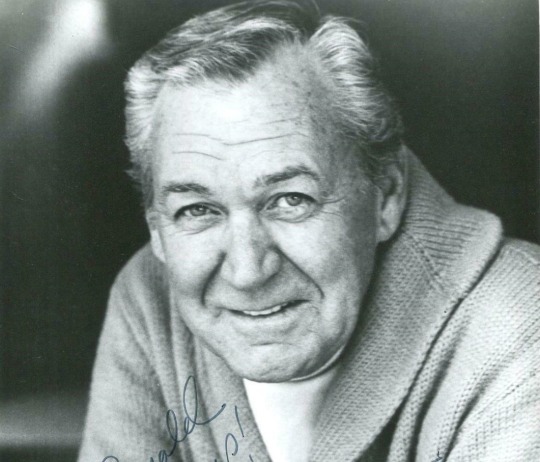
Physique: Average Build Height: 6’ 4" (1.93 m)
Forrest Meredith Tucker (February 12, 1919 – October 25, 1986; aged 67) was an American actor in both movies and television who appeared in over a hundred film and TV productions. He appeared in films like The Yearling, Sands of Iwo Jima and The Abominable Snowman. Tucker is best remembered for his role of Sergeant Morgan O'Rourke on the television comedy series F Troop. Following the run of F Troop, he made a few more films and appeared often on television in shows like Gunsmoke, Marcus Welby, MD, Ironside, Fantasy Island and Love Boat.
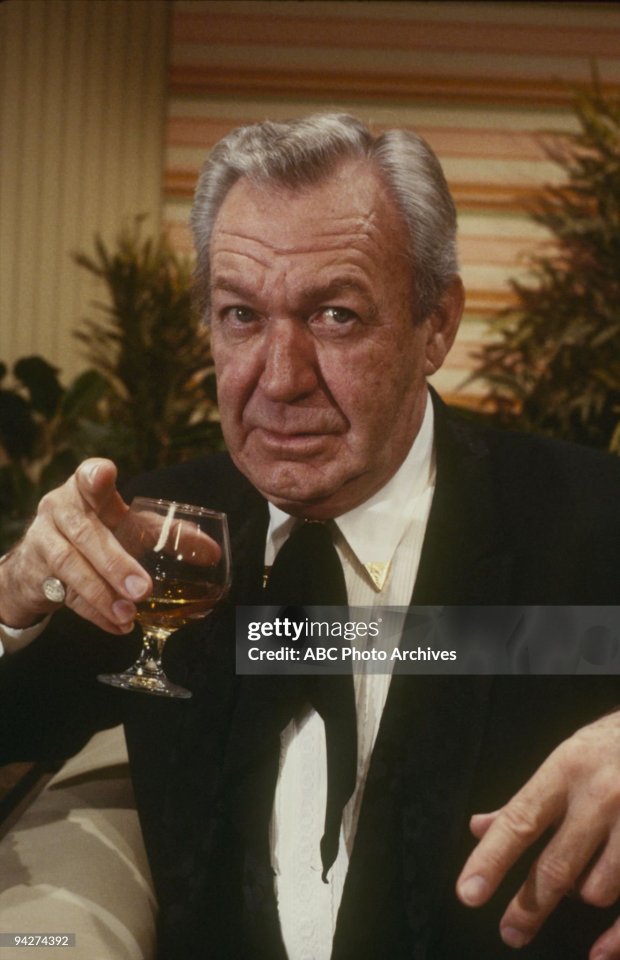
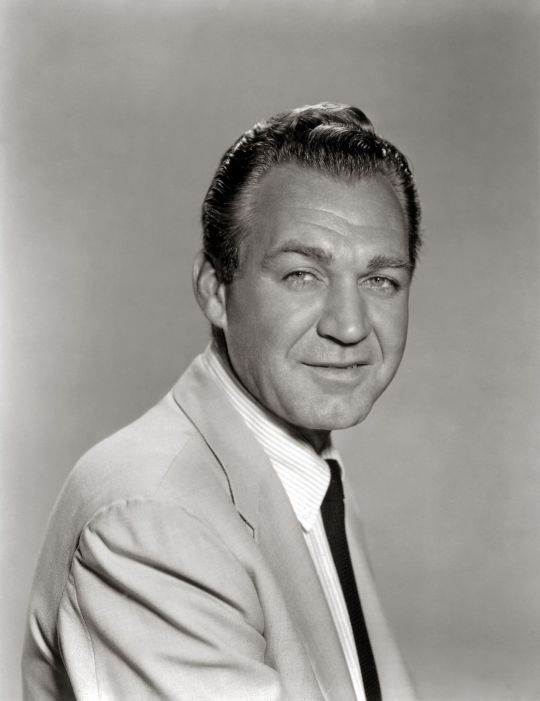
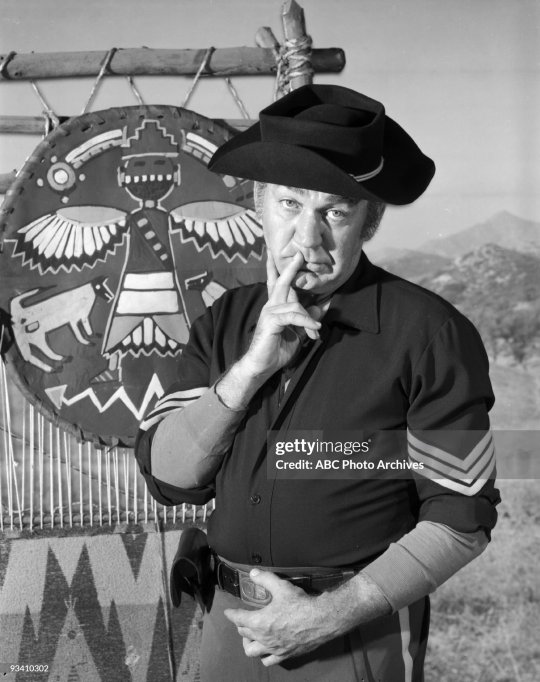
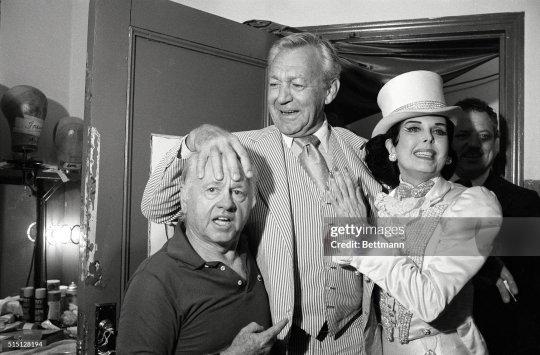
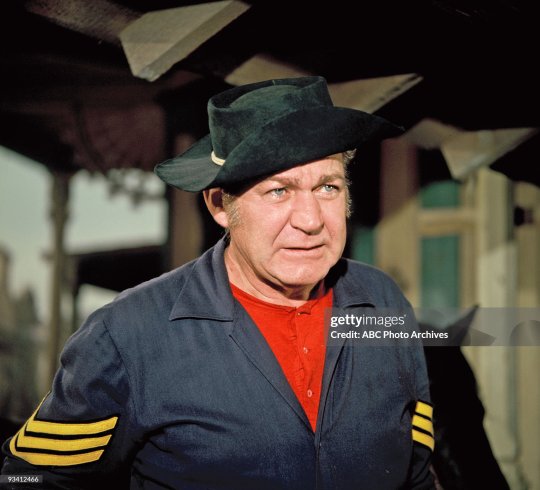
Tall, ruggedly handsome with thick wavy hair and a feature Tucker nicknamed, “The Chief.” A cock that’s comparable to some of the “big guns” of old Hollywood that includes Milton Berle, Frank Sinatra, Sammy Davis Jr., Gary Cooper, Charlie Chaplin and Groucho Marx. I haven’t found any info stating size, but it has to be big from of the shots I’ve seen of him.
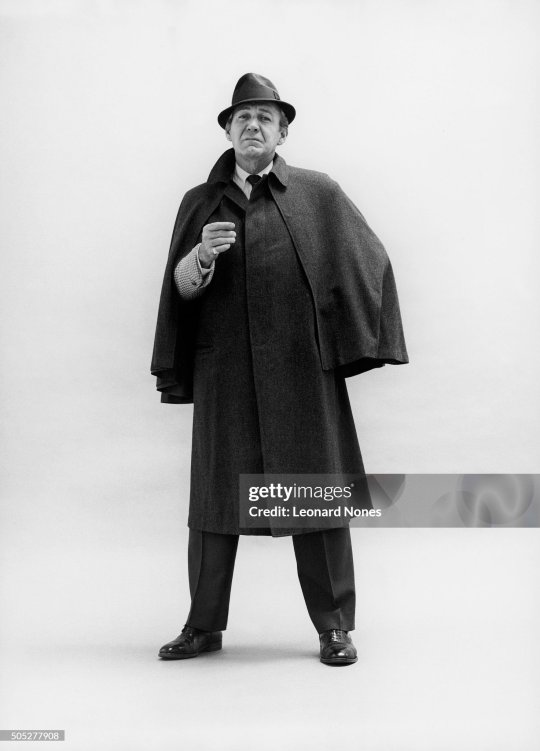
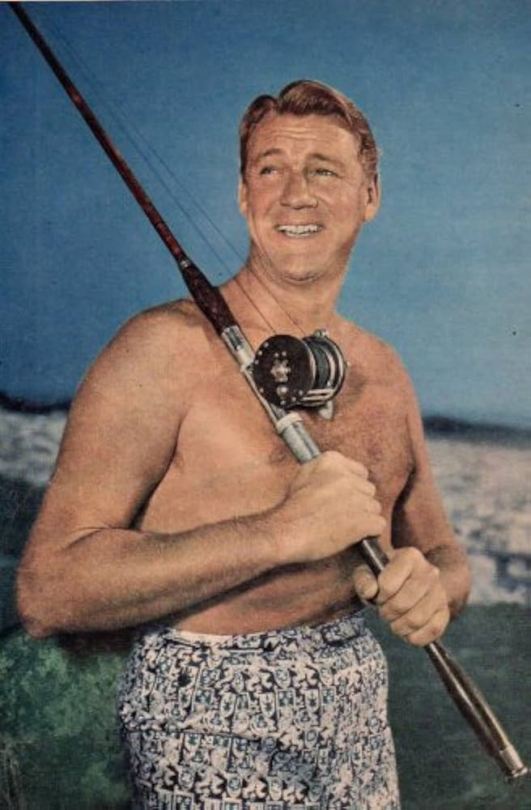
Born in Plainfield, Indiana, Tucker graduated from Washington-Lee High School, Arlington, Virginia, near Washington, D.C., in 1938, and, after joining the United States Cavalry, was stationed at Fort Myer in Arlington County, Virginia. Tucker's film career started well despite a perception in most Hollywood studios that blond men were not photogenic. He enlisted in the Army during World War II. After twenty years spent mainly in Westerns and action roles, he returned to his roots, showing versatility as a comedic and stage musical actor.
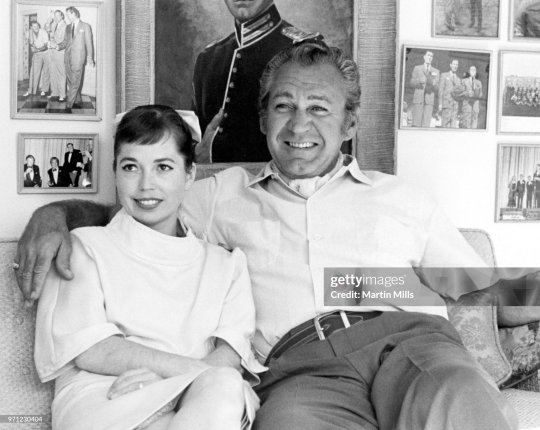
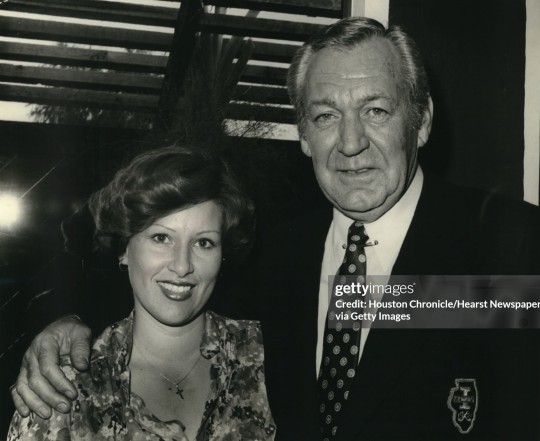
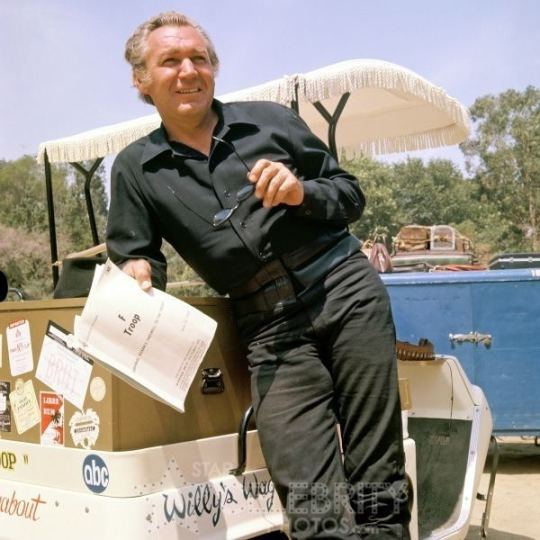
Tucker was married four times, having a thing for young ladies, fathering three children (one by his first wife and two by his third). Hail to The Chief I say! Apparently, Tucker struggled with a drinking problem that began to affect his performances in the later years of his career. Tucker died of throat cancer at the Motion Picture & Television Country House and Hospital on October 25, 1986.
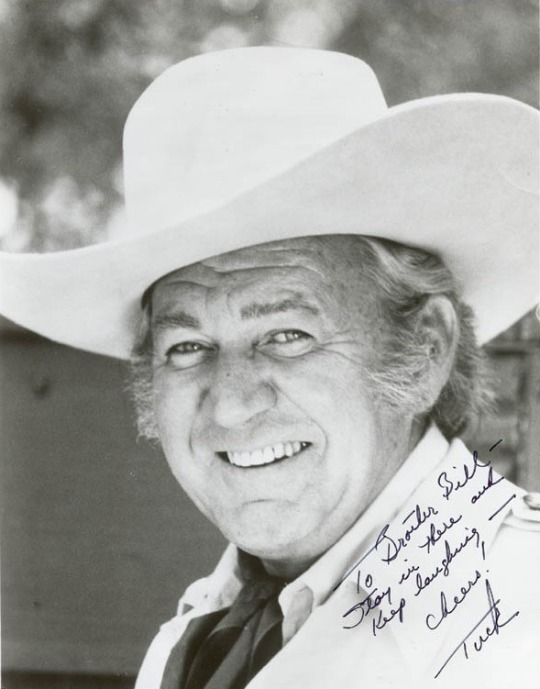
RECOMMENDATIONS: F Troop (TV Series 1965–1967) The Crawling Eye (1958) The Abominable Snowman (1957) Sands of Iwo Jima (1949)
65 notes
·
View notes
Text
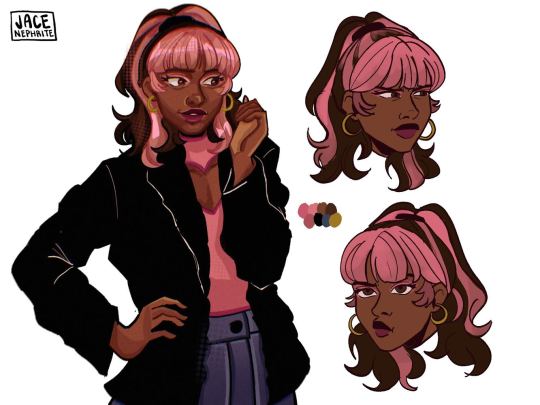
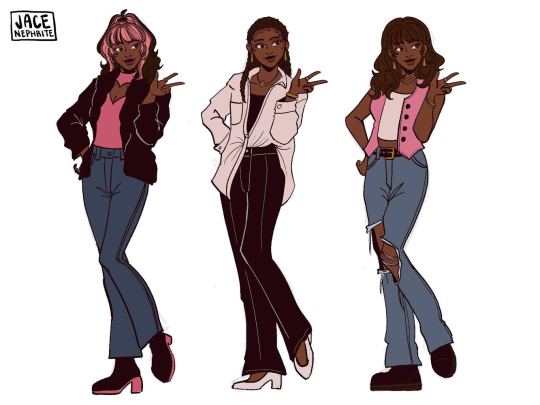
I asked for a commission of my DC OC Shay from @jnephrite and look at my girl!! 😭 She so pretty I can't even😭😭😭 Always loved @jnephrite art so seeing Shay in hers is a blessing 🙏🏾
And since the fic is almost halfway through posting, I thought, might as well introduce Shay properly! EDIT: the fic, Awaking in Gotham, is now completed!
EDIT: More art of Shay + art of a scene from fic
Full name: Shay Michelle Frank (♀) Occupation: Graphic Designer / YouTuber Height: 5'9" Birthday: September 16th ☀Virgo 🌙Aries ⬆Aquarius Proud African American/Haitian & Gothamite Hobbies: Poetry, Arts, Rap/R&B music, help the Gotham North Community Center, Discover new artists (both musically and visual arts)
Shay was born and raised in Gotham, close to the infamous Crime Alley, by her maternal grandmother, Marie-Monique "Manmi Mo" Antoine, and with her 3 years older brother Zachary "Zee" Frank. Her mother died of childbirth (she had had complications with Zee which was why she was hospitalized when pregnant with Shay) so her whole family distrusted the American health system. This is why when her grandmother was diagnosed with cancer, they didn't go to the hospital and only went to the illegal clinic. (Also; money.) Her father is unknown.
Ever since young, she went to the Gotham North Community Center, mostly run by the Black and Latinx communities of the Crime Alley neighbourhood. Her grandmother would teach the children about mostly Black literature but also all sorts of arts which is why Shay is such a creative person. That's also where she met Jason Todd for the first time when she was around 4-5.
Her brother very early on started to "run the streets" and started to hang out with bad crews, but always had his heart on his sleeves. He just couldn't find other ways to get money to make sure Shay had the right education/a chance away from crime.
Her grandma died when she was almost 17 and her brother died not even 4 weeks later (2 weeks after her 17th birthday) because of a dispute between gangs. (Allegedly)
After her grandma and Zee died, she went to live in Metropolis with her second-degree cousin, Jennifer Antoine, until she graduated from university. Even when in Metropolis, she would go as much as she could back to Gotham to see her people/help the center.
She started a YouTube channel talking about Gotham's art and musical scene to change people's persepective of Gotham after too many people at Metropolis U "pitied" her for being a Gothamite.
As soon as she was about to graduate, she applied to work at Wayne Entreprise back in Gotham. She got a job as a graphic designer and moved back to her city.
At the start of the fic, "Awaking in Gotham", she is 22 and has been working at WE for almost a year.
Read more about Shay (and her love story with Jason) on AO3! (Trying to update every week!)
Random notes about Shay:
As I wrote in the fic's notes, the first reason for creating Shay was: who the fuck would stay in Gotham that isn't a criminal and/or a vigilante??
So I created a black girl who loves her community and sees all it could be while being very conscious of what it is and its dangers. Then I went, hey! she'd be good with Jason while I was starting my Jason Todd Thirst so obv my fic turned into romance. lol
The name comes from Belgian rapper Shay, Montreal-based singer Shay Lia, and Haitian Montreal-based singer Shah Frank. As I was creating Shay I was obsessed with all three of them and the name Shay Frank wouldn't leave me.
Ngl, I gave a lot of me to Shay; like her Haitian roots and GAD but very quickly she went her own way and grew in this character I'm proud of. I'd like to say I also gave her my music taste but she is way more into hip-hop than me and she rejects most of my pop playlists (sadly).
Because Shay was based on me, all her entourage I created is based on people in my rl. lol
I also absolutely wanted her to be friends with Bernard because I absolutely love Bernard (and Bat SO who are civilians? Tim and Jason bonding over the fact their SO are the only civilians in the Batfam?! So many fun things to do!!)
Zee is also a character that I love, based on one of my favourite cousins, and I got lowkey mad at myself halfway through that he was dead. So I have an AU where he didn't die in my head lol
I'd like to write a oneshot of it when I'm done with this fic.
Last fun fact about Shay that I wasn't able to put in fic yet: all the rogues annoy her (mostly because they cause mayhem that cancel events) but she madly respects Poison Ivy because of her convictions and: "is she wrong tho?"
I have a lot of other small notes about Shay and the Shay-verse but I'll post the rest when the fic is completed!
EDIT 2024-10-04: I completely forgot to add the link to the post fic notes! So if you read Awaking in Gotham do check those other notes!
#dc oc#orginal character#black character#Shay Frank#jayshay#jayoc#dc#fic writing#lowkey want to change all my icons for shay#my girl is so pretty I can't#there's so many things I wanna tell you guys but I guess I have to wait for after fic#dinde even enter all my Jason hc for this universe 😭#and all the center people 🥹
84 notes
·
View notes
Text
My perspective on "kategate" is rooted in personal & professional (American) experiences. Perhaps this post will help someone.
My Charles- Catherine theory:
Charles' Cancer diagnosis was not entirely unexpected
BRF is hoping for the best AND preparing for the worst
In My imagination: Before the Coronation, Wills & Kate revisited their checklist of major things to do before Wills becomes king: Kate's surgery was on that list. Charles feeling "unwell" sped up the timing of what may have been Catherine's "future" surgery.
A planned (disruptive) medical event scheduled to fit the best time in the life of a princess who is the future queen consort & mother of his heir.
What the world knew:
BRF Major Health Updates
PROSTATE Procedure -king
Benign ABDOMINAL surgery -wife of king's heir (princess)
Results
Undisclosed location of malignancy-king
Successful surgery. Medical leave of absence (at minimum) through Easter-princess
Protocols
Weekly (undisclosed) "treatments" & crowd control -king
Discharged home to Windsor to continue recovery-princess
Prognosis
Caught early (intentional slip via Rishi)-KC
Making good progress-Princess
Princess well enough to travel to her Amner home w/husband & kids for school break
What the Media Heard
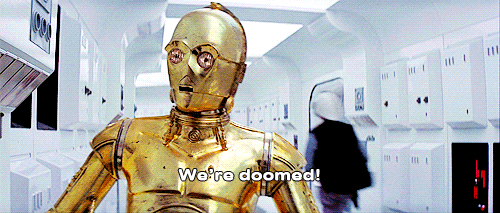
What the Media Did...

Tumblr to the Media: stop feeding the sewer squad!

I've personally experienced a medical talk: "at some point in your life, you should PLAN x (a very disruptive) operation"
"We advise you to make PLANS to undergo x surgery, preferably before the age of your mother's x. Pick the best time for your busy schedule and lifestyle as it will be a major disruption. It's prophylactic so there's no rush and of course this is a recommendation, but studies show that it will prevent you from developing x or at minimum, significantly decrease the probability of you ever developing x, a life threatening malignancy. Sorry, we cannot tell you when, but just PLAN to do it when it fits your (busy) lifestyle & schedule."
Me during "the talk"
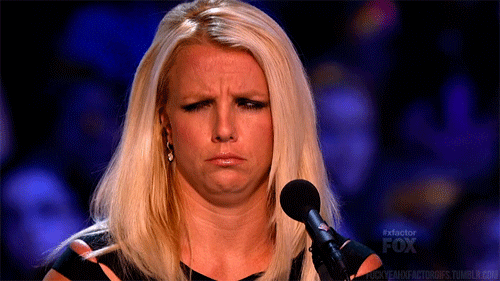
Me listening to 2nd 3rd 4th opinions

Sometimes our PLANS get interrupted
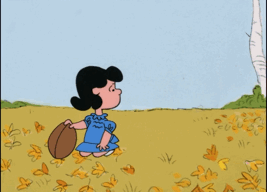
"In the end, everything will be okay. If it's not okay, it's not the end."

How did the British media vultures ignore "Keep Calm and Carry On"

Many members of this family have been treated for malignancies and other life threatening illnesses and yet they have remained tight lipped.
Perhaps King Charles had a recurrence or even developed a malignancy secondary to previous adjuvant treatments. No one needs to know the location of his tumor.
Perhaps Catherine's procedure was not prophylactic. She could have been uncomfortable for a very long time. No one needs to know Catherine's diagnosis.
I do want them to be well & become humble servants of Christ Jesus, like Queen Elizabeth.
Open to hearing corrections & thoughts.
#get well soon#keep calm and carry on#brf#king charles cancer#king charles#prince and princess of wales#kate#catherine the princess of wales
101 notes
·
View notes
Text
my very VERY impromptu Trump-Kamala thoughts
I wanted to have a proper look at both of their charts and analyze them with respect to the elections and so I thought I'll share with you guys some notes that I'm making in my head.

So if you're not familliar with Trump's chart, he was (kinda famously among astrologers) born on a lunar eclipse in Sagittarius - his a Gemini Sun is conjunct Uranus and north node (which helps his leadership qualities) and Sagi Moon conjunct the north node (which brings misfortune to women around him… in one way or another). He also has Mars on his Leo ascendant, which just makes his Gemini self be even more yappy and arrogant know-it-all.
Currently he's in his Saturn profection year and I've talked about it in my previous post but his natal Saturn is in the 12th house of secrets, loss and succlusion. We still don't know what his felony conviction in September will be but what I will say is that Saturn, not only in the 12th but also on exile in Cancer is like double banishment - it's not only themes of being isolated because of the 12th but planets that are in the sign opposite to its domicile often act like rejection of some sorts - and it's either something that rejects you or that you reject yourself, depending on the topic involved.
On the election day, Jupiter will be right on top of his north node and Mars will barely enter his 1st house, giving him more energy and power (mind you that Mars will later retrograde back to his 12th!). Saturn will move away from t-squaring his luminaries but it will still quietly do its malefic job from his 8th house. What's also worth noting is that Uranus will still hover over his MC and square his Mars. So that disruptive energy will linger and Jupiter's influence over his planets might just blow it out of proportion even more.
Interestingly on November 5th we'll have two major transits: Venus opposite Jupiter and Mars opposite Pluto. This is a very strong push and pull and kind of like a battle of the feminine and masculine.

Kamala on the other hand, was also born during a lunation - she has Libra Sun directly opposite Aries Moon (feisty lady she is indeed!). So she's also a full Moon baby. Not an eclipse one but her nodes are just as prominent with the north node right on her Gemini ascendant - she's here to evolve and to do things for the people. And make silly remarks about coconuts Gemini-style.
There we have it guys, the battle of Geminis!
She's currently in her 12th house profection year, where her natal Jupiter is placed. Funnily, her Jupiter is where Uranus currently transits and where Trump has his MC - the Mars-Uranus conjunction surely affected her in a good way. Because she's a Libra, at the time of the elections she'll already be in her 1st house profection with Jupiter transiting her 1st, elevating her as a person. So both of them have support from the benefic.
The beginning of November will also be a notable Saturn transit for her with it opposing her Uranus, Pluto and Venus. As well as Pluto and Mars making a grand square to her luminaries (and to her ascendant ruler, Mercury!) This is a make or break kind of transit but will it give her enough clout and power to push through with the votes or will it bring her defeat?
What's worth noting with her is that soon she'll start having eclipses in the 4th-10th houses, which can bring changes in her living situation and career - but again, it's hard to really guess if that change means stepping down and leaving the White House or upgrading her status.
One thing that is for sure is that starting next year, the US will go into its Uranus return, which historically brought a lot of upheavals and wars every time so no matter who wins, shit will most probably go down.
My guess is that'll happen under potential Trump presidency - somehow he may be that trigger whether willingly or not or some other shocking stuff happens in the meantime and THAT will be the root of the american shitstorm???
Another interesting point is that on the inauguration day Sun will conjoin with Pluto - so we have the theme of forceful power and leadership or some other unpleasant things yet again. Venus will also just move past Saturn, which makes me think of the defeat of the feminine - OR maybe because Venus is exalted in Pisces this is the feminine stepping into authority and a moment of a metaphorical cease-fire and ease.
#mercurytrinemoon#astrology#astro notes#astrology notes#celebrity chart#political astrology#mundane astrology#donald trump#kamala harris
27 notes
·
View notes
Text
Kinger (Alexander) Michael Smith
Age when he joined: 26
Height: 7’2
Age Now: 50
Fave Color: Royal Purple
Sexuality and Gender: Cis Male, Straight Ally and Biromantic
Pronouns: He/Him
Personality Type: INFJ
Zodiac: Cancer
Home State/Country: Minnesota (Canadian American)
Birthday: July 6, 1975
Year he joined: 2001
Headcanons
He first studied to be a Botanist professor, but because he was a teenager in the 80's and 90's, and everything was going to technology, he ended up making computer games. He is the original creator of TADC. He only brought it to C&A because he didn’t have enough funding to complete the game. He and Queenie made the game together, Kinger was in charge of the coding and Queenie was in charge of designing. They even made their own avatars.
Able to summon any chess piece he desires, even a queen piece. Is also able to summon a chess board and his staff at anytime and to use however he pleases. The staff can be used to summon said chess board and chess pieces. Queenie was able to do the same thing and they’d have chess matches together. His cape acts almost like a portal, he’s able to store random things in there, and people (with their consent of course)
He had a great childhood, he had a wonderful family, although not very rich, they had enough to put food on the table.
He was bullied as a kid for being “So weird” and never had many friends growing up until he met Queenie, she was a transfer student from England and Kinger immediately fell for her. They got along great and finally Kinger had a friend.
Over the years, they became lovers and Highschool sweethearts and planned to go to the same college together. Queenie for Entomology and Kinger for Botany. They did graduate but found their skills useless in the rapidly developing world of technology. They began to make a game about their interests and made TADC.
They found an ad for C&A in a newspaper and rushed over to see if the game was good enough for them. Dane loved it and helped them make it reality, literally. He made headsets and used Kinger and Queenie As his first test subjects.
Kinger is smart but also very stupid.
He also cries during Disney Movies
Kinger is oblivous to any and all romantic interest someone may show them.
Kinger likes board games, but no one else wants to play with them.
Kinger sleeps with a color changing nightlight, it reminds him of Queenie.
Kinger will accidentally knock someone over because he's so tall.
Whoever the girls are on their period's (irl) Kinger will go full on dad mode and do whatever it takes to help them feel better.
While pulling an all-nighter, Kinger almost drank the lethal dose of caffeine.
Kinger once stole a lollipop from the store when he was 7 and still feels bad about it.
Still believes in Santa.
Get to know the king!
Chinese Horoscope: Rabbit
Spirit Animal: Elephant
IQ: 123
Nicknames: Old man (Jax), Sweetheart (Artsy), Dad (Gangle and Pomni), Dude (Zooble),
Allergies: Shellfish
Disabilities: Limp in his right leg, Autism and ADHD, Short-term memory loss, Partial blindness in his left eye.
Right or Left Handed: Left
Quirks/Habits: Bites nails, Clenches jaw, is always sweaty.
Siblings: 2 younger sisters and 2 older brothers
Who is the most important person in his life: Queenie and Artsy
Person he looks up to the most: Queenie
Best Friend: Ragatha
Lover: Artsy
Rival: None
If he could have a superpower it would be: Perfect mind and memory
Dream Job: Botanist
Biggest Fear: Artsy abstracting
Biggest Flaw: Not being able to remember anything.
Favorite Animal: Dogs
Favorite Hobby: Tending to his flower garden
Favorite Food: Pizza
Favorite Drink: Root Beer
Least Favorite Food: Anything seafood
Favorite Season: Winter
Favorite Movie: A Christmas Story
Favorite Book: Lord of The Rings - J.R.R Tolkien
Favorite Singer/Artist: The Rolling Stones
Very skilled at: Making pillow forts
Least skilled at: Remembering things
Greatest Achievement: Making TADC with Queenie
Pet Peeves: Clicking pens, People talking with their mouths open
Introvert or Extrovert: Introvert
Organized or Messy: Messy
Is he good at singing: Somewhat
Can he bake: Sometimes
Can he cook: No
Does he play any sports: No
Instrument: Organ
Motto: “The worst thing you can do is make someone feel unwanted, so treat everyone with love.”
Theme Songs
Two Time - Jack Stauber
The Mind Electric - Miracle Musical
10 notes
·
View notes
Text
All Too Well, Part 9
{"Mom, I'm tired. Can I sleep in your house tonight?"}
Part 1
It seemed like everything was falling to place for her. It was quite cool outside, but Miho didn't mind. Her hand was warm, interlaced with Suguru's. The six of them had taken a day trip to Shibuya. Her breath fogged in the air. Laughter rang out in the crisp fall air. Satoru was charging straight ahead, tossing his shopping bags to Kento, who threatened to drop them on the ground.
"I can't believe it's almost time to go home," Yu said, stretching his arms over his head, "Where are you guys going for the holiday?"
"We still have like three weeks," Miho said.
"I gotta go see my parents," Shoko sighed.
Yu and Kento both voiced similar plans. Satoru made a face. "I'll probably just go to Suguru's like last year."
"Don't you think you should ask first?" Kento asked.
"Why would I do that?"
"Because it's polite!"
The six teenagers stopped at the crosswalk. Suguru nearly stepped out, having been watching Miho the whole time. Satoru grabbed the back of his jacket just in time to keep him from walking out into traffic, snickering, "Eyes on the road, lover boy."
"What about you, Miho?" Yu asked.
Miho blinked at him, "Oh, I'll just be at the school."
"What about your parents?"
She shrugged, " Administration won't let me leave. I haven't seen them in almost two years."
Satoru pursed his lips, looking over at his friend. Suguru squeezed her hand. "We'll ask if they'll let you go this year. I'll go with you."
"What am I supposed to do?" Satoru whined.
Just as Suguru was opening his mouth to answer, a cell phone rang. Everyone checked their phones. It was Miho's.
"Speaking of my parents," she muttered, flipping the phone open, "Hey, mom."
The crosswalk light turned green. Her friends began walking forward. Suguru started, but stopped when she didn't follow. Miho was rooted to her spot. Her glassy eyes began to swell with tears. Suguru called out to their group before turning to her again. Her voice shook as she spoke.
"...Dad?"
---
Two hours later, she was sitting in a Nagano hospital waiting room. Miho stared forward, hands clasped tightly together. Her knee bounced rapidly. Suguru sat next to her, arms crossed. He reached over to grab her hand. She squeezed it tightly.
The hospital was full of lower grade curses. Nothing major, just the typical small fries often associated with the grief found there. She wasn't worried about them.
"Did they say how far the cancer progressed?" Suguru asked quietly.
"It's eaten up her insides," Miho said numbly.
He could only nod.
A man walked out, wearing a dress shirt and pants. He was a foreigner, most likely American if Suguru had to guess. A typical salary man, clean cut with short dark hair and green eyes. You could see the fatigue in his gaze from endless nights at the hospital, the deep wrinkles in his clothes from coming straight from the office.
Miho stood. Suguru followed.
"Dad," Miho barely managed.
Miho's Dad hugged her tightly. His face crumpled in grief, suddenly seeming much older than it really was. The man held his daughter as if the world were collapsing around them, as it surely was, as his only connection to his dying wife was suddenly tangible and in front of him. He kissed Miho on the top of her head.
Suguru kept his gaze down, silently standing so they could have a moment together. His phone buzzed quietly in his pocket. Suguru stepped to the side to answer. It was Yaga.
"Hello?" Suguru said in a low voice.
"Where the hell is Miho?"
"She's with me. In Nagano."
"She can't leave the school grounds without permission-"
Suguru lowered his voice, turning away. "Her mom is dying. We had to go."
Silence on the other end. Finally, Yaga said, "I'm sending Satoru. Just to keep the higher ups from pitching a fit. Do not allow her to use her technique-"
Suguru closed his phone and returned to the matter at hand.
"Dad, this my boyfriend," Miho said, gesturing to him.
Suguru smiled and bowed politely. "Suguru Geto. I'm sorry we're meeting under such circumstances."
Her dad returned the bow and reached to shake his hand. "Ray Tsukiyomi. I am too. Thank you for coming." He turned to Miho and sighed heavily. When he spoke again, it was in English. He asked Miho for help filing paperwork.
---
Her mother passed just hours later.
Suguru closed his phone, having just sent Satoru the address to the hospital. He stood outside of the hospital room, listening to Miho's quiet sobbing.
What a strange feeling it was. To hurt so much for someone, and yet be unable to do anything to help. Death was a natural phenomenon. They both faced it often in the field as Jujustu Sorcerers. But somehow it was entirely out his grasp how to make everything alright for her. They had only been dating a month. He wasn't close enough to be in there with her. But he was too close to simply stand in the hallway.
She stepped out while her dad went to tell the nurse. Suguru met her with open arms. He rested his chin on the top of her head as she sobbed into his chest. His arms enveloped her whole, like a life vest keeping her afloat. His heart ached with every sob that left her.
Satoru was rushing over to them as they exited the hospital, flowers in hand. He pulled Miho into his arms as soon as he was close enough.
"I'm sorry," he said into her hair, "I'm so sorry, Miho."
---
"Why didn't anyone tell me she had cancer?"
Trees whizzed by the train window. Miho stared at the passing scenery. She gritted her teeth, moving her hardening gaze to the empty plate in front of her as if she could shatter it with her mind.
Only a few hours until they were required to return to Tokyo.
"We told the school as soon as we found out. They said they would tell you." Her dad had said. "About six months ago."
Satoru was watching her from across the aisle. His glowing gaze flickered from her stony face to Suguru's. Thank goodness they had gotten a private booth seat. Miho was thankful for that. She didn't want to speak to anyone.
Her Cursed Energy was spiking. Suguru reached over to place his hand on her knee. It was both a warning, and a comforting gesture. Calm down. We're here for you.
At that very moment, she didn't want to be calm. She wanted to kick. And scream. And claw. She wanted to dig her fingernails into flesh and tear away at bone. As trees faded into buildings, Miho felt a deep anger simmering over her.
At that very moment, if given the chance, she would have killed every person in administration.
Part 10
25 notes
·
View notes
Text
They say, in the end, “history is destiny.” A recent trip to the supermarket reminded me just how true this is.
I am the daughter of German Jewish immigrants who proudly embraced their new, foreign land when they arrived in New York in 1946. My grandmother, Frau Becker, from Leipzig, Germany, traveled by ship with her family in the aftermath of World War II. She arrived with little more than the clothes on her back — and a few treasured artifacts to remind her of home, including a trove of recipes. One of which, penned in a careful German cursive script, was for spaetzle.
Spaetzle, a type of small noodle or dumpling made with fresh eggs, was always accorded a special place at my grandmother’s rectangular wooden table. The preparation of food was such a pre-eminent event in our family, and she made it from scratch, stretched out on a white linen cloth. My mother told me:
“Deine Oma wird jetzt spätzle Machen. Schau dir an, wie sie es macht, damit du weiBt, wie.” (Your grandmother is going to make spaetzle now. Look at how she makes it so that you know how.)
“Bestimmt” (certainly) I replied, although my 8-year-old mind was more focused on the annoying antics of a young male cousin who was taking the head off my Barbie doll.
I watched my grandmother roll out the spaetzle dough so that it was approximately a half-inch thick, switching seamlessly between French and German as she instructed her children to pay attention to her efforts so that, someday, the dish could be replicated for future generations. Spaetzle was often accompanied by bratwurst or wienerschnitzel, and the adults all drank schnapps with the meal. For a family who’d had more than their share of hardships — my mother and her siblings had hidden in convents, monasteries and farms in the French countryside while most of their extended family perished in the Holocaust – sharing food was a unifying force. But it was mostly German cuisine. As a young child, I craved the things I saw my American counterparts eating: hamburgers, pizza, hot dogs, though none of these ever passed through our doors.
Once I left home for college, my German heritage took a backseat to my burgeoning American identity. While I occasionally found myself thinking in my family’s native tongue, it wasn’t until my late 20s that I accepted that one could not escape one’s history. That despite my attempts to become as American as apple pie, my German roots had shaped me into someone else. And no one represented those roots more than my grandmother.
By this time, my grandmother had passed away from cancer at age 81, surrounded by her family in Los Angeles. Shortly after her death, my cousin sent me a selection of photos of her. Studying them provoked a sudden urge to learn more about her. Through stories, my mother taught me of her lively intelligence and humble demeanor. That, among her many virtues, she was well-known as an excellent cook.
On a recent trip to the supermarket, history clapped back at me when my eye alighted on a box of spaetzle in the pasta aisle. With an emotional jolt, I realized that I hadn’t thought about it since I left home for college at 19. I purchased the box, but on the ride home I suddenly heard my grandmother’s accented voice reminding me that real spaetzle is a dish you make yourself.
Once home, I put the box in the cupboard with a guilty conscience, and began to look for my grandmother’s old recipe, lettered in her German cursive script. The ingredients were simple enough: flour, egg and a bit of milk mixed into a pancake-batter-like consistency. Dropping little lumps of the batter into some salted boiling water then ensued. When the lumps finally took form, plumping up into particulate morsels, I drained off the hot water, forcing myself to wait for them to cool before digging in. The first bite reconnected me to my childhood — to the tastes of my bubbe’s kitchen, and the sounds of immigrants talking in their native languages, their home a refuge in this strange, new land.
The box of spaetzle I bought, which I know I will never use, still sits high upon a kitchen shelf, recalling the architecture of a former life. It reminds me that each of us is knit of an infinite fabric of previous histories; that I cannot separate my identity from my past, but can reside happily in my European and American worlds. When my son nearly trips on a street curb while alighting from our car, the word “Vorsichtig!” (Watch out!) suddenly issues from my throat. I tell him my own stories about the great-grandmother he never knew, who poured love and soul into her food, so that her story is not forgotten. The word “spaetzle” is now a part of his vocabulary, and one day he will make that delicacy, with his bubbe’s blessing, on his own.
19 notes
·
View notes
Text
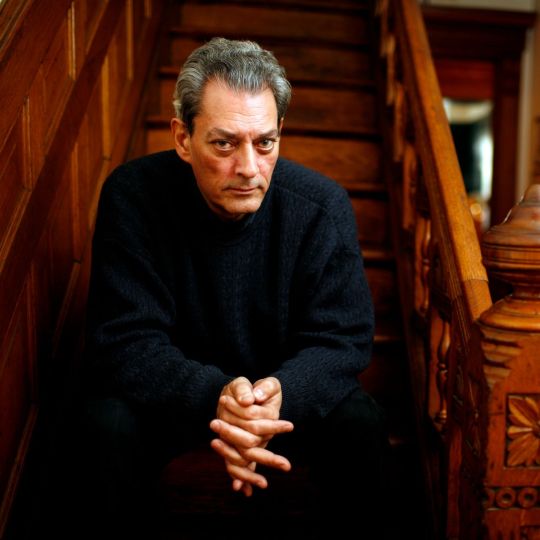
Paul Auster
Author of The New York Trilogy who conjured up a world of wonder and happenstance, miracle and catastrophe
The American writer Paul Auster, who has died aged 77 from complications of lung cancer, once described the novel as “the only place in the world where two strangers can meet on terms of absolute intimacy”. His own 18 works of fiction, along with a shelf of poems, translations, memoirs, essays and screenplays written over 50 years, often evoke eerie states of solitude and isolation. Yet they won him not just admirers but distant friends who felt that his peculiar domain of chance and mystery, wonder and happenstance, spoke to them alone. Frequently bizarre or uncanny, the world of Auster’s work aimed to present “things as they really happen, not as they’re supposed to happen”.
To the readers who loved it, his writing felt not like avant-garde experimentalism but truth-telling with a mesmerising force. He liked to quote the philosopher Pascal, who said that “it is not possible to have a reasonable belief against miracles”. Auster restored the realm of miracles – and its flip-side of fateful catastrophe – to American literature. Meanwhile, the “postmodern” sorcerer who conjured alternate or multiple selves in chiselled prose led (aptly enough) a double life as sociable pillar of the New York literary scene, a warm raconteur whose agile wit belied the brooding raptor-like image of his photoshoots. For four decades he lived in Brooklyn with his second wife, the writer Siri Hustvedt.
The fortune that drives his stories played a part in his own career. City of Glass (1985), the philosophical mystery that launched his New York Trilogy and his ascent to fame, appeared from a small imprint after 17 rejections. Though the novel helped build his misleading reputation as a cool cult author, a moody Parisian existentialist marooned in noir New York, it had a pseudonymous forerunner that shows another Auster face.
Squeeze Play, published under the pen-name “Paul Benjamin” in 1982, is a baseball-based crime caper. Its disconsolate gumshoe, Max Klein, muses that “I had come to the limit of myself, and there was nothing left.” If that plight sounds typically Auster-ish, then even more so was the baseball setting. Auster adored the sport and played it well: “I had quick reflexes and a strong arm – but my throws were often wild.” In a much-repeated tale, he failed aged eight to get an autograph from his idol Willie Mays, of the New York Giants, because he had not brought a pencil. Auster “cried all the way home”.
Auster’s work is more deeply embedded in the mid-century national culture that fuelled the novels of his elders, such as Philip Roth and John Updike, than some advocates appreciated. His fables of identity-loss and alienation have emotional roots in the mean, lonely city streets he knew when young. He once insisted, to fans and scoffers who labelled him an esoteric “French” or European coterie author, that “all of my books have been about America”.
He was born in Newark, New Jersey (also Roth’s hometown). His parents, Queenie (nee Bogat) and Samuel Auster, children of Jewish immigrants from eastern Europe, set him on a classic American path of upward mobility through education while remaining, to their son, opaque. The Invention of Solitude (1982) was Auster’s haunting attempt to imagine the life of his impenetrable father. Ghostly fathers would pervade his work. As would sudden calamity. When, aged 14, he witnessed a fellow summer-camper struck dead by lightning, the event became a paradigm for the savage contingency of life, “the bewildering instability of things”. His later novel 4321 (2017), which revisits this formative trauma, cites the composer John Cage: “The world is teeming: anything can happen.” In Auster’s work, it does.
At Columbia University in New York, he studied literature, and took part in the student protests of 1968, before moving to Paris to scrape a living as a translator of French poetry (a surrealist anthology was his first published work). He lived – literally in a garret – with the writer Lydia Davis, and returned in 1974 with nine dollars to his name. Back in New York, they married, but were divorced in 1978, a year after the birth of their son, Daniel. Poetry collections followed, but Auster’s thwarted efforts to secure a decent livelihood meant that he gave his ruefully funny 1997 memoir Hand to Mouth the subtitle “a chronicle of early failure”.
In 1982, he married the novelist and essayist Hustvedt (who recalled their courtship as “a really fast bit of business”). She became his first reader and trusted guide; they had a daughter, Sophie. Husband and wife would work during the day on different floors of their Park Slope brownstone, and watch classic movies together in the evening. Auster wrote first in longhand, then edited on his cherished Olympia typewriter.
The New York Trilogy (Ghosts and The Locked Room followed a year after City of Glass) made his stock soar, and attracted both celebrity and opportunity.
Auster wrote gnomic screenplays for arthouse films (Smoke, Blue in the Face, both 1995), even directed one (The Inner Life of Martin Frost, 2007). But it was the enigmatic, hallucinatory aura of his fiction – in 1990s novels such as The Music of Chance, Leviathan and Mr Vertigo – that defined his sensibility. Sometimes this trademark style could veer into whimsy or self-parody (as in Timbuktu, 1999, with its canine hero) although stronger novels – such as The Brooklyn Follies (2005) – always pay heed to the pulse, and voice, of contemporary America. Keenly engaged in current affairs, Auster held office in the writers’ body PEN, deplored the rise of Donald Trump, and spoke of his country’s core schism between ruthless individualism and “people who believe we’re responsible for one another”.
Auster the exacting aesthete was also a yarn-hungry storyteller. If he edited a centenary edition of Samuel Beckett – a literary touchstone, along with Hawthorne, Proust, Kafka and Joyce – he also compiled a selection of unlikely true tales submitted by National Public Radio listeners. They revealed the strange “unknowable forces” at work in everyday life. In his epic novel 4321, the formal spellbinder and social chronicler meet. It sends a boy born in New Jersey in 1947 down four separate paths in life: an Auster encyclopedia, ingenious but heartfelt too. Bulk and heart also characterised his mammoth 2021 biography of the Newark-born literary prodigy Stephen Crane, Burning Boy.
The ferocity of fate that scars his work gouged wounds into Auster’s life as well. Daniel succumbed to addiction, accidentally killed his infant daughter with drugs, and died of an overdose in 2022. Auster’s cancer diagnosis came in 2023. Prolific and versatile as ever, in that year he still published both an impassioned essay on America’s firearms fixation (Bloodbath Nation) and his farewell novel, Baumgartner. Its narrative hi-jinks dance smartly over a bass chord of grief.
Auster populated a literary planet all his own, where the strange music, and magic, of chance and contingency coexist with love, dream and wonder. In Burning Boy, he wonders why Crane’s output now goes largely unread, although “the prose still crackles, the eye still cuts, the work still stings”. After 34 books, so does his own.
Auster is survived by his wife and daughter, and a grandson, and by his sister, Janet.
🔔 Paul Benjamin Auster, writer, born 3 February 1947; died 30 April 2024
Daily inspiration. Discover more photos at Just for Books…?
19 notes
·
View notes
Text
Replying to this awesome post by @corvoidea on Pluto in Aquarius
corvi says:.
It is almost as though there was a massive focus and near-obsession in reflecting on home, family, the motherland, etc. and you see that reflected in the rise of Hollywood culture in the 1920s. Especially because the USA's birth chart has a Cancer Stellium in the 7th house. Of course, this hyper-focus on family and home in the United States also led to extreme issues in other parts of the world such as the rise of Hitler in Germany, Stalin in the Soviet Union, Benito Mussolini in Italy, etc. But relating it to Pluto in Capricorn - I think the current transit through the 1st house is breaking down a lot of those stories and bringing to light a lot of the not-so-great things that were happening. In the old days of Hollywood, as well as currently with the abuse of child stars (children = Cancer), as well as women and the exploitation they endured under other executives.
I just shared the reply where @luciddownloading wrote about the opposite sign getting Pluto-ed too, which feels really applicable in this convo. Pluto moving through the 1H-7H axis is a story of "good guys" and "bad guys", "me vs you", which would have started back with the terrorism fears in Pluto Sagittarius. So Pluto through 1H needs a "you", a "bad guy", an "other" to play out the story.
Now through the 2H, which will continue with Pluto Aquarius, the story is "ME, who DESERVES THIS" versus "YOU, the THIEVING BEAST". Does kind of make me think of the American Revolution last Pluto Capricorn.
I think a lot about the 1H and 2H. In the birth charts of individuals, when I talk to them about it, I feel like planets in the 1H almost don't even seem real to them. It's like they don't notice them, they're so innate to their experiences. But people notice what's in their 2H. It's a very personal, intense place. (Has to be; it's opposite the 8H.)
I also have this thing where I feel like "women", as a "class", is a 2H house. Like I personally feel like you can use derived houses to make the 2H the 1H of "women's lives" in society. (Also cause historically women "are" "property".) (I think it could be considered the same for any "subordinate" or subculture beneath the dominant culture.) I started thinking about this to try to have an answer for the popular thing online about how girlhood is monstrosity. This way, a woman's derived childhood house would be seen through the eyes of the first chart as 6H, of illness. And how what is a relationship to the first chart isn't equal, because it's to an 8H derived house, of sacrifice, mutilation, and control. A woman's (derived) 3H, of education and growing community, is the 4H of the dominant culture, and a woman's (derived) "roots" (4H), is the house of sex (5H) to the dominant culture.
Anyway, that you brought up the USA chart reminded me of this. Because looking at the birth chart of USA and Pluto transit goes through the 1H, a place that is so intrinsic to the nation's being it feels we can't touch or understand it. Then goes through the second house, that feels actionable but also savage, because 2H opposes 8H. With Pluto in Aquarius, the brutality of questions of value and possession will persist, as it has in history.
(I love that you brought up the USA chart. I didn't even think about it lol)
corvi also says:
I think Pluto in Aquarius is going to either: - Cause a cult-like mentality in terms of fame & celebrity, specifically in politics. - Cause people to push ordinary people into the spotlight whose work is geared toward the greater-good.
Yeah! I think this is what I was trying to get around to with my first examples, particularly with Gypsy Rose! I need to do more research about all that, though, cause I don't actually know anything about what she's up to today.
There is definitely a "death" going on right now when it comes to "traditional" celebrities and people's perception of who becomes famous and why, just as you mentioned. I think a lot of people are also slowly becoming more and more frustrated with hyper-vanity pushed by families like the Kardashians.
Which is ironic, I think, considering the Aquarius-Leo axis we're entering! I read through replies and what they've posted on their own blogs about Pluto Aquarius and some people believe social media's gonna (in my melodramatic words) implode and die. I kind of lean that way, too, just because of all the frustration that's been building with social media and technology, and the inklings of people quitting social media, opting for "dumb phones", etc.
People have also split about whether glamour and vapidity will become more popular, or less. I think the World Astrology Report on Youtube did a really cool video on Pluto in Aquarius worth thinking about, about the terms within Aquarius and how they played out 260 years ago. (I can't link the video cause I can't find it; he's made so many Pluto Aquarius videos I don't remember which one it was.) If I remember right, I think maybe around the Venus term, glamour may peak, and after that it may crash.
I hope Pluto in Aquarius causes a collective shift away from celebrities and causes people to be more focused on activists, writers, journalists, etc. who are fighting for human rights and the wellbeing of everyone. Of course, I could be completely wrong. Pluto in Aquarius could very well cause celebrities to become desperate to hold onto any influence they have and peddle in a very dystopian and strange kind of cult-like following via social media in ways we do not expect. It could also cause those who are hungry for fame and self-centered to resort to manipulation (Pluto) utilizing other forms of technology (Aquarius) to keep their power and influence (Pluto again) over the collective and communities (Aquarius).
I've been thinking about this, too. I don't know how "complete" Pluto's upsets are, y'know? I think in individual charts, Pluto transits may end up more "complete" by the end of its wanderings. But in mundane astrology I wonder if Pluto just digs everything up and says "deal with it" while it continues on its way. Our current stories aren't ending, just shifting. And how we're digging those things up is shifting. I wonder if the way we approach things might just be more Aquarian--which is still Saturnian--but it's still just the same old stuff. Just like what you said in the last paragraph.
What if AI is the enemy that pulls up the mirror? What if things really do go Terminator? Wasn't it critical thinking--a value of Capricorn--that dug the grave of Capricorn governance? How does it slide to activism, Truth, and righteousness?
We're already kind of seeing something happen, with Gaza, and the emphasis on Truth, and access to Truth Telling.
But at the least, as we saw in Pluto-Capricorn, the values of meritocracy and government were obliterated, and obliterated by its own example/history of merit and governing. At the very least, I think we can expect the Aquarian value of Truth to be obliterated by remembering our history just the same.
corvi also says:
I do think we are going to see a significant shift in the belief of who gets to be and power and why. But I think it will be a global shift that we are probably not ready for. ... I am a little worried about potential civil conflict and revolutions abroad. Despite the way Americans and other Westerners romanticize revolutions - revolutions are not "amazing" or empowering at all. They are violent, painful, and the people who suffer the most are civilians caught in the crossfire. And the power vacuum left behind can cause unimaginable suffering, as we saw with the Yugoslav Wars - which was led by many Pluto in Leo individuals who carried out genocide and other violence against civilians. I am hoping for the best. I would love to see more Carnation Revolutions & Velvet Revolutions and other non-violent overthrows of horrible people in power. My biggest hope for Pluto in Aquarius is true Democracy and freedom for everyone.
Absolutely. I trimmed your blurbs here, but I agree with the hope for non-violence. I wonder if freedom and non-violence is possible in a Saturnian sign, or an Air sign, and if it can be so with USA's Gemini Return coming up. (The Astrology Podcast has many episodes about the USA Uranus return in Gemini historically coinciding with war, like this one.)
Something I think about a lot is the atom bomb. That was Pluto in Leo, too. I thought it was important that Venus Rx in Leo this past summer saw the Oppenheimer movie for that reason. Maybe the story of that being fresh in mind can alter something in us.
I took a sociology of war class. Sociologists love to classify patterns in levels of society. I don't remember the whole thing, but there's one theory that ideological societies like ours--ones that ally themselves based on ideology as opposed to something like nationalism--has isolationist war. They are push-a-button wars; nuclear wars; wars that spur proxy wars in "less developed" areas to "play" their war for them. Seems very Aquariuan. Seems very Uranus in Gemini to me. But with everything in sociology, we gotta stop being so gloomy and hope for the best anyway lmao or our souls will die.
The Astrology Podcast also seems to be anticipating a change to democracy. The very idea of it scares me because I don't know anything else, but I do think that's a happier resolution than war. But I wonder if we won't see a "new democracy" until Pluto in Pisces, because I think Uranus in Gemini is going to be a big player. And wherever Neptune could be in all that, too.
28 notes
·
View notes
Text

general information.
full name beau ryan clary
nicknames thirty-four ( the number on his jersey ) mostly just his last name
age 28
date of birth july 14th, 1996
place of birth brantley, alabama
zodiac cancer sun pisces moon taurus rising
gender cis male
nationality american
religion raised baptist / currently uncertain
orientation homosexual
physical attributes.
face claim paul mescal
voice claim paul mescal but if he was from alabama no i don't have an example
height 5'11
weight 184 lbs
build athletic / muscular
exercise habits intense daily workout regimen
allergies mold / strawberries
hair color brown
hairstyle somewhat overgrown and shaggy
eye color grey - blue
glasses/contacts no
dominant hand right
tattoos inspiration / detailed post to come
scars several small scars on arms and legs
piercings left earlobe double pierced with two small silver hoops
outfit/clothing style 1 2 3 4 + ny jets branded athletic wear
jewelry/accessories watch / simple silver band on right hand / thin silver chain
background information.
hometown brantley, alabama
current residence new york, ny
spoken languages english / asl
driver's license yes
occupation running back for the new york jets
familial information.
relationship status single? kind of? / in a relationship pre-outbreak
mother edie clary ( nee williams ) / status unknown
father patrick clary / deceased
siblings orla clary ( older sister ) / dixie + june clary ( younger sisters )
other ivy emerson ( cousin )
children none
pets a ginger tabby cat named nacho that belonged to his boyfriend pre-outbreak that he found in his apartment alone a week later when he went looking for him and took back to the wexley
personality.
positive traits kindhearted / hard-working / empathetic / grateful / polite
negative traits emotional / detached / unstable / isolating
likes clean socks / early morning workouts / poetry / sunrises / game days
dislikes social media / awkward silences / toxic masculinity / uncertainty / rats
moral alignment neutral good
mbti esfj-t
Before the outbreak, Beau Clary was just about one of the most charming fellas you could hope to meet in a place like New York City; he was raised on the notion of southern hospitality and helping thy fellow neighbor, and even after gaining more fame and fortune than a small-town boy like him knew what to do with, Beau never let it warp his attitude or his ego or make him forget his roots. Hard-working and helpful, he was always the first to lend a hand. And, to be fair to him, he still is, but it isn’t quite the same. He’s hardly a shell of the exuberant, social creature he used to be; where most nights would have previously found him mingling with other residents of the Wexley or heading out to any of the countless bars or clubs studding the streets of the boroughs, lately he’s become enough of a recluse that he mostly only comes when called unless there’s work to be done. To most, he appears aloof and detached - a defense mechanism to keep from letting anyone too close - but to those he trusts, glimpses of the Beau that once was still remain in fleeting smiles and occasional warm, rumbling laughter. In truth, he’s soft and sensitive at heart, and where he used to wear as much as a badge of honor in a sport that previously defined toxic masculinity, in this new world, it appears to be a crippling weakness and one that Beau has tried desperately to stifle and hide away.
biography.
Despite the pressure and public scrutiny that came from being such a high draft pick, Beau seemed to thrive in the world of professional football. The chaos and cacophony of the city were certainly something to get used to, but Beau quickly acclimated - or, if not, he made enough trips home and flew his family out to the east coast enough that he was able to keep grounded in an overwhelming concrete jungle. The next several years were spent working hard and playing harder and he’d been in the middle of an incredibly successful — and potentially Super Bowl worthy— season and it could be argued that Beau was in the prime of his career - and his life - when the outbreak hit New York. The explosion of the entrance to the Wexley was, in a sick, twisted sort of way, the perfect visual representation for the tumult of emotion that accompanied such catastrophic panic and grief. His entire world was in shambles, and it took significant convincing from those closest to him not abandon his apartment for a foolishly suicidal mission to get back home to Alabama — to his family. He did, however, make two separate trips to try and find his partner, the man he'd been beginning to grow serious with just before the outbreak ; both trips to his apartment were met with disappointment, and no evidence whether he was dead or alive. Not knowing only made it worse. Winter was long and hard, and though Beau could often be seen around the Wexley, coming out of the woodwork wherever work needed done to lend a quiet hand, he’d frequently slink back to his apartment without a word once the work was done, keeping to himself. He grieved the loss of a family he feared he’d never know the truth of, nursed the guilt of knowing that if they were gone, it was in part because he’d not been there with them. He hadn’t been there to help them, to protect them.
Beau Clary was born in a small town in rural Alabama where the number of stoplights could be counted on one hand, everybody knew everybody else’s family, and twice a year, the local high school had a drive your tractor to school day. There wasn’t a whole lot to do growing up, and when Beau wasn’t at school or helping tend to his family’s land and animals, he was playing pickup games with friends out in wide, open fields, quickly proving himself to be a natural at football. Despite the limited opportunities available for someone like him - and they were few and far between in a town nestled so far below the poverty line and nearly forgotten by the rest of the state - Beau was determined to make something of himself and get out of Alabama. He channeled this energy and determination into the sport, excelling on his high school team and garnering the praise and encouragement of local coaches and faculty. In his senior year of high school, Beau’s dedication finally paid off. Even out in the middle of Nowhere, Alabama, there were universities sending out talent scouts. He’ll never forget the way his mama cried and hugged him the day she found his acceptance letter from Clemson in the mailbox - she didn’t even wait for him to get home to open it, and she was waiting at the door when he walked through because, in her words, her baby got a full ride!
With his tuition covered and his degree paid for, Beau was able to focus all of his energy on honing his skills at the sport. At Clemson, Beau continued to shine on the field, becoming a dominant force in the league and a leader amongst his teammates. When he wasn’t on the field, he was studying for any number of his horticultural science courses - academics did not come naturally to him in the same way athletics did, but Beau worked hard to ensure he maintained a respectable GPA the entire time. He was well-liked by his peers and his educators, a friend to everyone who happened to cross his path, and in the end, his limitless positive karma and perseverance paid off. His success on the field coupled with his natural charisma and leadership skills caught the attention of NFL scouts and, when draft day came, Clemson University running back Beau Clary was selected in the first round by the New York Jets. He drove back home after that to spend a few weeks back home in Alabama before flying out to New York to get settled in his new place before he left. A photo snapped by a sports photographer at the airport of an openly-crying Beau hugging his mother goodbye achieved viral status after it was shown on ESPN, and from that moment, his name became a household one and his life was never the same.
On December 23rd, when rock bottom opened up like a giant chasm beneath the Wexley — quite literally beneath it, in the basement — and Mr. Wexley encouraged everyone to abandon the building in light of the newly-chompified residents and return once it was safer, Beau was among those staying behind and forced to evacuate. In the chaos, he tried to help anyone else he came across in his own pursuit to safety, and he and the few people he could find holed up in a bodega not half a block down from the Wexley that had been ransacked but appeared secure — save for two chompers that Beau managed to dispatch with the aid of another survivor to secure the premises. When he finally returned, it was to devastation and grief — it seemed inescapable these days. He dove headfirst into cleaning up what he could of the physical mess left behind by the chaos, his body and his mind itching for busy work. He just needed to keep himself occupied, focused. Distracted.
headcanons.
Beau still writes letters to his family back home - at least one a week, but often even more - even though he knows he’ll never be able to send them or receive one back.They've been collecting in an old shoebox, but it's starting to fill up as of late.
He was the second-ever active player to openly come out as gay in the NFL, and his decision to do so was divisive amongst fans, but his team was unwaveringly supportive.
Beau was in a somewhat serious relationship before the outbreak, and he’s not seen his partner since it all began. He’s made two reckless and dangerous attempts to visit his apartment, but he’s found no evidence that he’s alive or dead aside from his cat, alone and unfed — and somehow, not knowing what's happened to him is worse.
He’s got a section of his smaller, open floor plan of apartment - he had to downsize when he moved to the third floor from the tenth level - filled with the two things that make him happiest - his family and nature. He’s tended to a number of houseplants as best he can in spite of everything, and the walls are covered with photos of his parents and siblings, cousins and friends.
#↳ intro#↳ about#i'm sure i will add more to this periodically but it's long enough as is skljdhlksjdhs#his bio is in here too bc fuck it#bnyintro
10 notes
·
View notes